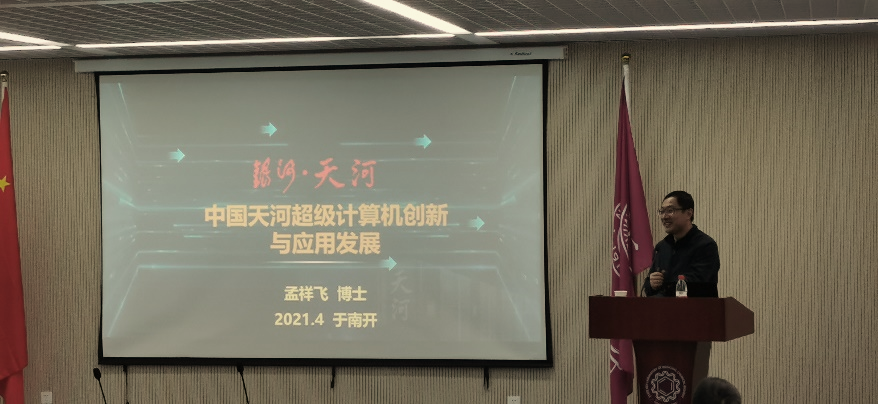On April 21, Meng Xiangfei, the chief scientist of "Big Data Processing Technology and Application" of National-Local Joint Engineering Laboratory under the National Development and Reform Commission, the assistant director of the National Supercomputing Center in Tianjin, and a professor-level senior engineer, visited the State Key Laboratory of Medicinal Chemical Biology of Nankai University and gave a lively and wonderful lecture on the Innovation and Application Development of China Tianhe Supercomputer.

As an important scientist in the field of supercomputers, Meng Xiangfei was once invited to give a wonderful lecture in the program Voice on CCTV. His lecture at the State Key Laboratory of Medicinal Chemical Biology this time also attracted many students of Nankai University who were interested in supercomputers.
Supercomputer is a "super tool" to promote scientific and technological innovation and industrial development, which provides a favorable guarantee for building a strong country in science and technology. To deepen students' understanding, Meng Xiangfei explained the history of supercomputers in depth. From a behemoth to a nano-scale chip, from the unreachable to the present in every aspect of people's lives, Chinese supercomputing scientists have made great contributions.
Supercomputers are used for everything and matter in every corner of life. So how powerful is the supercomputer? Meng Xiangfei cited an example to illustrate: "In 2010, China's supercomputer Tianhe-1 has achieved a computing speed of 2570 trillion calculations per second. The amount of computing the machine does for one hour is equivalent to that of 1.3 billion people simultaneously calculating on their calculators for 340 years." Supercomputers reflect China's progress from catching up with other countries to leading them. It is believed that China's supercomputers will reach a higher level through the efforts of several generations.
Coming to the State Key Laboratory of Medicinal Chemical Biology, Meng Xiangfei also highlighted the application of supercomputers in the pharmaceuticals industry, in which the use of supercomputers to simulate the dynamic process of cell invasion by the SARS-CoV-2 virus drew the attention of students and teachers.
At the end of the conference, students from the State Key Laboratory of Medicinal Chemical Biology asked their questions to Meng Xiangfei, who answered them one by one.